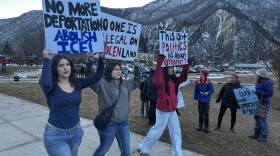-
In many of Colorado's rural mountain towns, basic services can be few and far between. It especially impacts older residents. Limited social programming, or even the absence of a place to gather, can leave seniors isolated. Locals in Lake City are working to change that.
-
Every Valentine's Day, tens of thousands of cards from around the world detour through Loveland, Colorado, for a special postmark. The annual tradition brings nearly 100,000 cards through the local post office before they are sent on to their final destinations.
-
'Constellations of Place' offers a different kind of reflection as it recognizes these milestones. Rather, it’s an invitation to honor Durango’s complex history of colonization through the lens of Native American, Indigenous, and Latinx artists.
-
Less federal pressure, worsening drought, and more interstate tension loom over Colorado River talksThe federal government manages the biggest dams on the Colorado River, but it hasn't been taking a forceful role in negotiations between the states on how to allocate increasingly scarce water in the basin.
-
-
Ace of spades playing cards were left in abandoned vehicles last month after U.S. Immigration and Customs Enforcement detained the drivers, according to a Glenwood Springs-based Latino advocacy nonprofit. The cards have historically been used as an intimidation tactic.
-
A lack of snow, compounded by warm temperatures, has plagued Colorado, Utah, and Wyoming. That will impact how much water is available come spring runoff.
-
A yearslong effort by some local residents to remove or restrict kids' access to certain adult books from Garfield County's public libraries has been largely unsuccessful so far, but with the recent appointment of two new library trustees by the county commissioners and the library district's executive director about to retire, changes could still be coming.
-
A journalist and Carbondale local, Stewart Huntington, traveled back to his hometown of Minneapolis last month to report on ICE activities and local resistance efforts.
-
Glenwood Springs High School closed on Friday after too many teachers called out to join a national day of action protesting ICE activity in Minneapolis. Students from Carbondale also walked out of school to protest on Main Street.

Play Live Radio
Next Up:
0:00
0:00
Available On Air Stations










